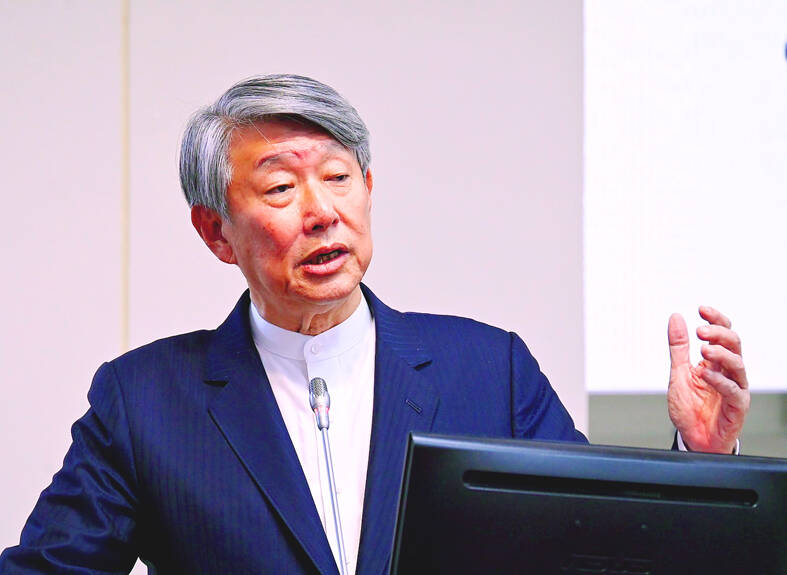The Ministry of Economic Affairs would fine companies that contravene country of origin laws NT$60,000 to NT$3 million (US$1,845 to US$92,251), Minister of Economic Affairs J.W. Kuo (郭智輝) said at the legislature in Taipei yesterday, adding that serious breaches would result in a suspension of a firm’s operations.
The government is paying extra attention to the issue of origins fraud, as it is a top factor in tariff negotiations between Taiwan and the US, Kuo told a meeting of the Economics Committee.
Asked by Democratic Progressive Party (DPP) Legislator Chiu Yi-ying (邱議瑩) how the ministry would prevent China from taking advantage of Taiwan in terms of product mislabeling and origin fraud, Kuo said that the ministry is closely monitoring the situation and preparing countermeasures.

Photo: Peter Lo, Taipei Times
“We will monitor import volumes, strictly enforce penalties with fines from NT$60,000 to NT$3 million per violation and revoke import-export licenses of fraudsters,” Kuo said.
The ministry would bolster anti-dumping investigations and raise awareness among local businesses about the matter, he said.
There have been nearly 800 cases of origin fraud since 2020, with fines totaling NT$29.58 million over contraventions of the Foreign Trade Act (貿易法) and the Act for the Establishment and Management of Free Trade Zones (自由貿易港區設置管理條例), Ministry of Finance data showed.
At a meeting of the legislature’s Finance Committee, Minister of Finance Chuang Tsui-yun (莊翠雲) said that the government would take all necessary steps to prevent attempts by firms to disguise the origin of their Chinese-made products.
The finance ministry has set up a task force to improve inspections of illegal transshipments at customs to prevent the use of Taiwan as a base for re-exports to the US to avoid higher duties, Chuang said.
However, as the fines stipulated by the free trade zones act are NT$30,000 to NT$300,000, far lower than the maximum NT$3 million stipulated by the Foreign Trade Act, the Ministry of Transportation and Communications, which is in charge of the trade zones, should consider increasing them, she said.
Meanwhile, National Development Council Minister Paul Liu (劉鏡清) said that the state-run National Development Fund has issued notices to all of its portfolio companies, requiring them to refrain from any country-of-origin mislabeling.
The council had received more than 40 responses as of yesterday afternoon, Liu said.
Separately, Kuo said that a tariff imposed by US President Donald Trump on Taiwanese semiconductor manufacturers’ products would mostly affect their clients in the US.
“The government will work hard with the US clients to let the US government understand what a negative influence a heavy tariff rate can cause to the industry, hoping to negotiate for a better rate for Taiwanese manufacturers,” he said.

The Taiwanese passport ranked 33rd in a global listing of passports by convenience this month, rising three places from last month’s ranking, but matching its position in January last year. The Henley Passport Index, an international ranking of passports by the number of designations its holder can travel to without a visa, showed that the Taiwan passport enables holders to travel to 139 countries and territories without a visa. Singapore’s passport was ranked the most powerful with visa-free access to 192 destinations out of 227, according to the index published on Tuesday by UK-based migration investment consultancy firm Henley and Partners. Japan’s and

NATIONAL SECURITY THREAT: An official said that Guan Guan’s comments had gone beyond the threshold of free speech, as she advocated for the destruction of the ROC China-born media influencer Guan Guan’s (關關) residency permit has been revoked for repeatedly posting pro-China content that threatens national security, the National Immigration Agency said yesterday. Guan Guan has said many controversial things in her videos posted to Douyin (抖音), including “the red flag will soon be painted all over Taiwan” and “Taiwan is an inseparable part of China,” while expressing hope for expedited “reunification.” The agency received multiple reports alleging that Guan Guan had advocated for armed reunification last year. After investigating, the agency last month issued a notice requiring her to appear and account for her actions. Guan Guan appeared as required,

Japan and the Philippines yesterday signed a defense pact that would allow the tax-free provision of ammunition, fuel, food and other necessities when their forces stage joint training to boost deterrence against China’s growing aggression in the region and to bolster their preparation for natural disasters. Japan has faced increasing political, trade and security tensions with China, which was angered by Japanese Prime Minister Sanae Takaichi’s remark that a Chinese attack on Taiwan would be a survival-threatening situation for Japan, triggering a military response. Japan and the Philippines have also had separate territorial conflicts with Beijing in the East and South China

A strong cold air mass is expected to arrive tonight, bringing a change in weather and a drop in temperature, the Central Weather Administration (CWA) said. The coldest time would be early on Thursday morning, with temperatures in some areas dipping as low as 8°C, it said. Daytime highs yesterday were 22°C to 24°C in northern and eastern Taiwan, and about 25°C to 28°C in the central and southern regions, it said. However, nighttime lows would dip to about 15°C to 16°C in central and northern Taiwan as well as the northeast, and 17°C to 19°C elsewhere, it said. Tropical Storm Nokaen, currently